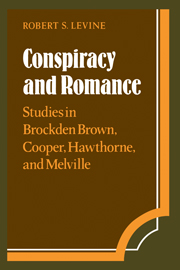Summary
Eternal vigilance is the price of liberty.
Wendell Phillips, Public OpinionIn a prefatory note to Edgar Huntly (1799), Brockden Brown issued a manifesto on the American–ness of American literature. His novel was in every possible sense “a new performance,” he proclaimed, for the new nation “opened new views” not only to “the naturalist and politician” but also to “the moral painter,” who necessarily should explore “new springs of action, and new motives to curiosity.” And because America offered the promise of new views, actions, and motives, it followed that the “field[s] of investigation” opened to its emerging writers “should differ essentially from those which exist in Europe.” Thus, Brown insisted, the American writer needed to relinquish such unsuitable European “materials” as “Gothic castles” and to embrace instead such “suitable” American materials as “incidents of Indian hostility, and the perils of the western wilderness.” This engagement with the distinctively American would lead to the production of a new and powerful literary art “calling forth the passions and engaging the sympathy of the reader, by means hitherto unemployed by preceding authors.”
Though Brown's reference to “the perils of the western wilderness” exuberantly directed attention to the presence of Indians, a specific social source for his fiction, it was more often the case that when nineteenthcentury writers assessed the early national and antebellum scene they noted various absences.
- Type
- Chapter
- Information
- Conspiracy and RomanceStudies in Brockden Brown, Cooper, Hawthorne, and Melville, pp. 1 - 14Publisher: Cambridge University PressPrint publication year: 1989



